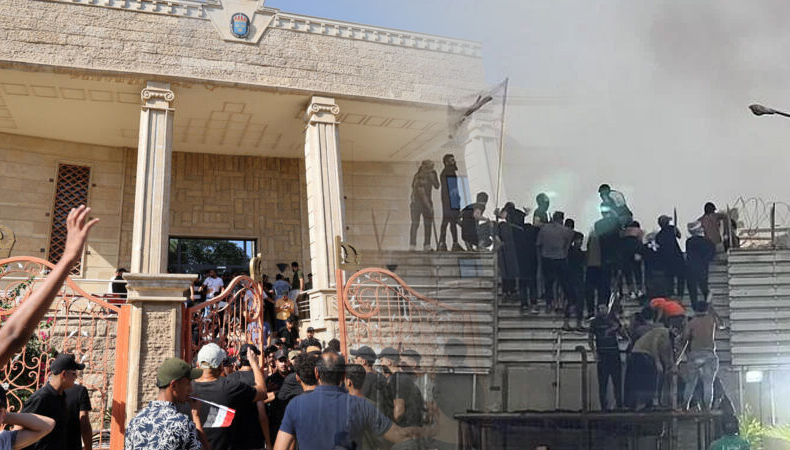Violent Protests at Swedish Embassy in Baghdad Over Planned Koran Burning

Hundreds of Muslim demonstrators stormed the Swedish embassy in central Baghdad early Thursday morning to voice their outrage and disapproval over the upcoming burning of a Koran in Sweden. Supporters of Shi’ite cleric Muqtada Sadr, a prominent figure in Iraq who has a history of organising sizable numbers for rallies, called for the protest. A public gathering outside the Iraqi embassy in Stockholm had previously received permission from the Swedish government, and participants intended to burn the Koran and Iraqi flag there. This incident brings to light the difficulties in balancing cultural sensitivity, freedom of expression, and mission protection.
Background: The Koran Burning Incident in Sweden
The current incident at the Swedish embassy was brought on by a string of occurrences in Sweden connected to the burning of the Koran, which Muslims consider to be a revelation from God and is the foundational text of Islam. An Iraqi man torched the Koran outside a mosque in Stockholm in June, a very contentious act. Invoking security concerns, Swedish authorities initially turned down many requests for subsequent protests that featured burning the Koran. The rulings were later overturned by Swedish courts, who claimed that the country’s rules protecting free expression protected such conduct.
Two people planned to burn the Koran and the Iraqi flag during a public gathering outside the Iraqi embassy in Stockholm, which the Swedish government authorised. Significant criticism and condemnation of the planned protest came from Sweden and the Muslim world. Shi’ite cleric Muqtada Sadr’s supporters in Iraq, reacted angrily and called for protests in front of the Swedish embassy in Baghdad.
Storming of the Swedish Embassy in Baghdad
Protesters gathered near the Swedish embassy in Baghdad, chanted pro-Sadr slogans, and eventually stormed the embassy compound, according to videos and accounts from the scene. In an effort to vent their ire at what they saw as an insult to their religious beliefs, the demonstrators stormed the embassy’s walls and set portions of the structure on fire.
Fortunately, no staff members of the Baghdad embassy were hurt during the incident. The Swedish foreign ministry denounced the assault and emphasised how crucial the Iraqi government’s protection of diplomatic posts is. Iraq’s foreign ministry responded by denouncing the violent protests and promising to launch a prompt inquiry to find and prosecute the offenders.
ALSO READ : On Sweden’s burning of Quran, Iran said, “Promotes terrorism and extremism”
Muqtada Sadr’s Influence and Past Demonstrations
Muqtada Sadr, a Shi’ite cleric with significant power in Iraq, has a track record of organising crowds of supporters to participate in protests. In the past, battles between Sadr’s supporters occurred in Baghdad’s heavily defended Green Zone. He has demonstrated a solid capacity to energise the populace with his calls for rallies against Sweden and the expulsion of the Swedish ambassador.
The violent protests that followed the incident in Sweden and Sweden underscore the fine line that must be drawn between freedom of expression and cultural sensitivity. Although many nations guarantee the right to free expression, activities that can be interpreted as disrespectful or insulting to religious views can elicit violent reactions. While defending the right to free speech and ensuring the security of diplomatic posts, authorities must manage these issues.
The Swedish embassy in Baghdad was stormed in protest of Sweden’s planned Koranic burning, underscoring the intense feelings and sensitivity surrounding religious convictions. It also emphasises the difficulties authorities confront in balancing freedom of expression with respect for cultural differences and security considerations. As investigations proceed, Sweden and Iraq will need to discuss how this episode may have affected their diplomatic ties and engage in communication to avoid similar conflicts in the future.




